Unit 9 Have you ever been to a museum Section A 3a-3c小阅读课件(共22张PPT)人教版英语八年级下册
文档属性
| 名称 | Unit 9 Have you ever been to a museum Section A 3a-3c小阅读课件(共22张PPT)人教版英语八年级下册 | 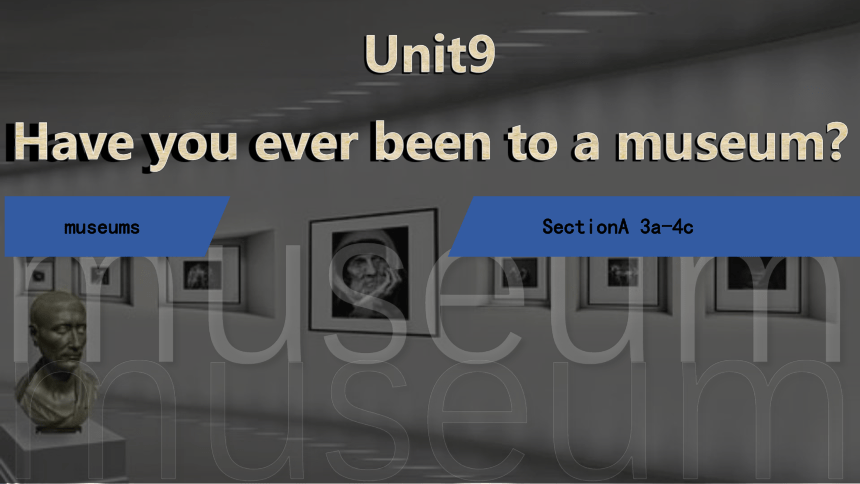 | |
| 格式 | pptx | ||
| 文件大小 | 33.4MB | ||
| 资源类型 | 教案 | ||
| 版本资源 | 人教新目标(Go for it)版 | ||
| 科目 | 英语 | ||
| 更新时间 | 2024-09-06 15:15:19 | ||
图片预览

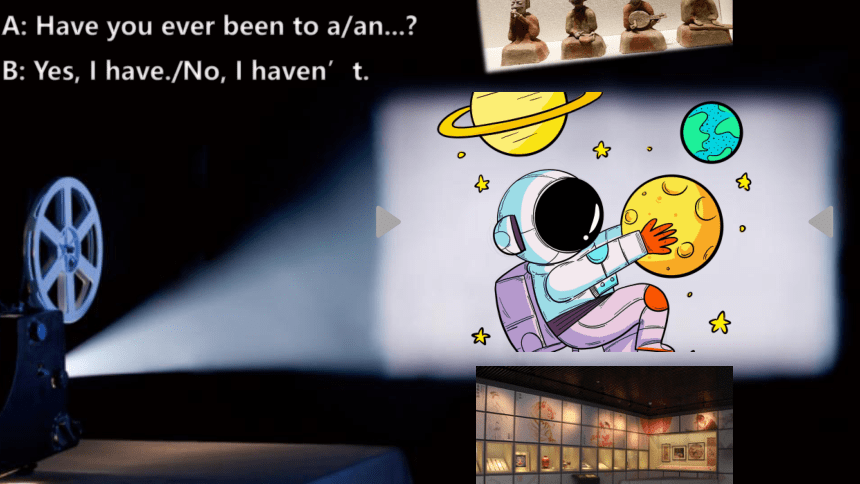
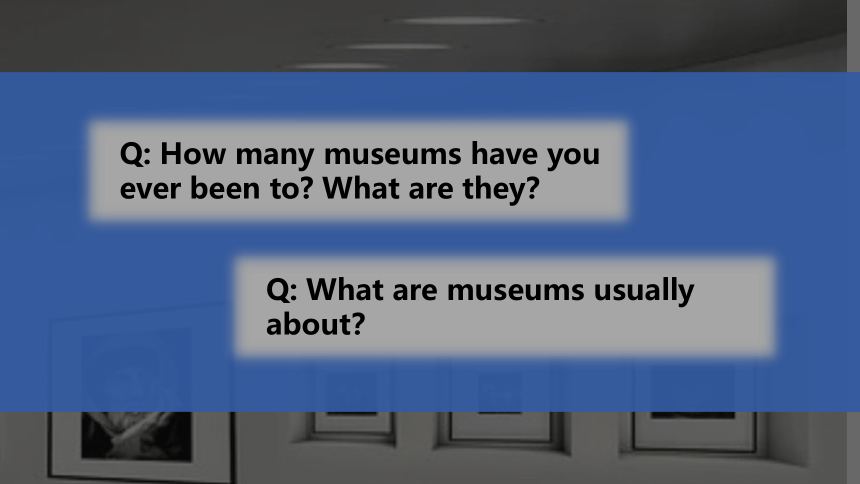
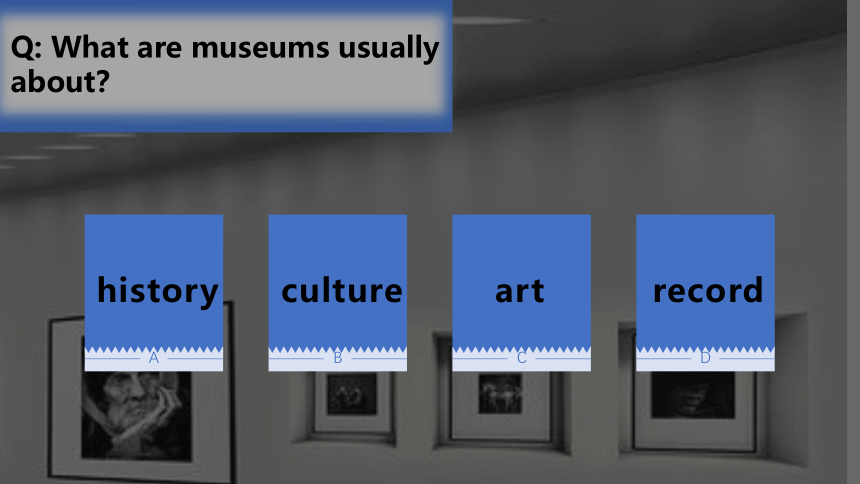
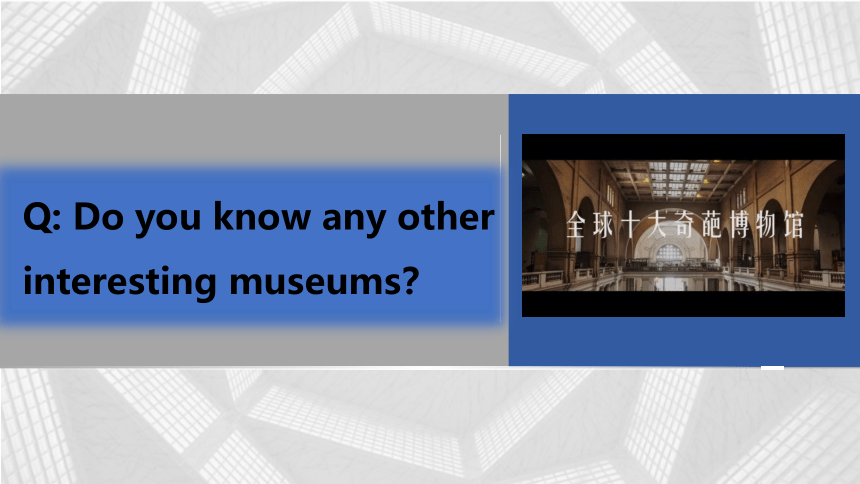
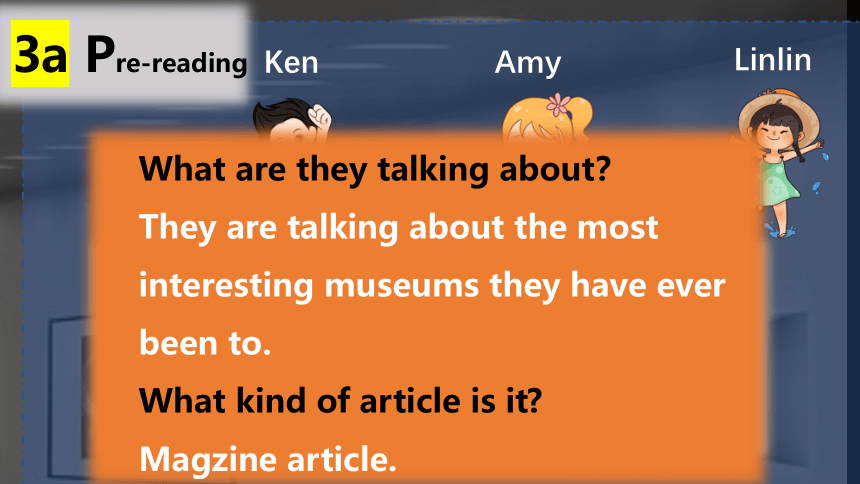
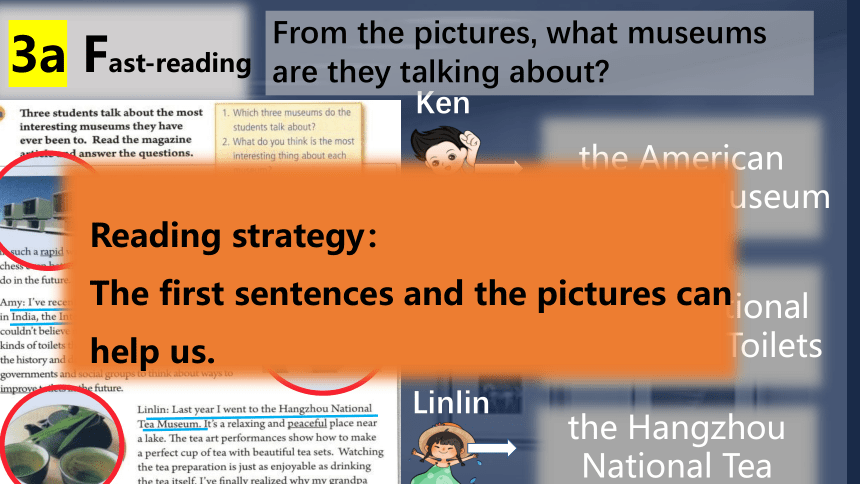
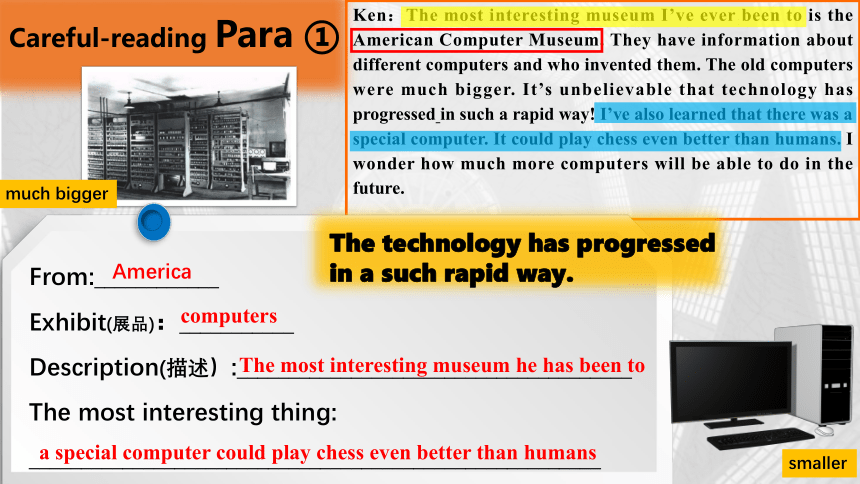
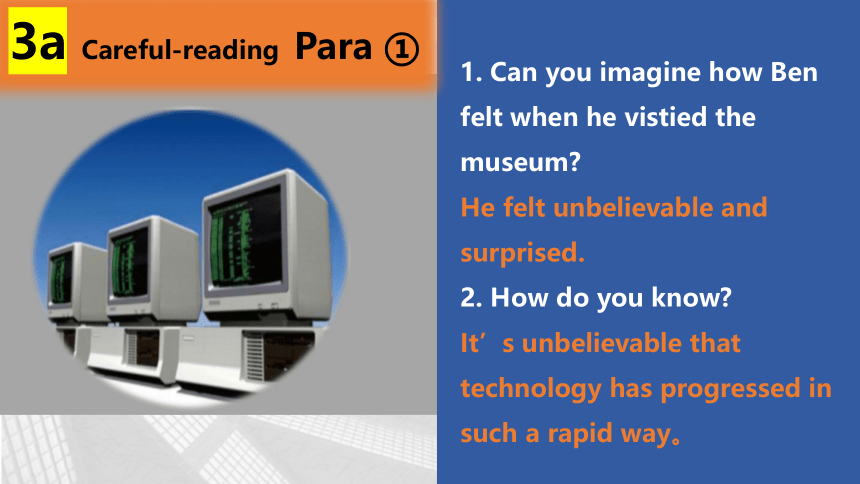
文档简介
(共22张PPT)
museum
museum
SectionA 3a-4c
Unit9
Have you ever been to a museum
museums
A: Have you ever been to a/an...
B: Yes, I have./No, I haven’t.
Q: How many museums have you ever been to What are they?
Q: What are museums usually about?
Q: How many museums have you ever been to What are they?
Q: What are museums usually about?
A
B
C
D
history
culture
art
record
Q: Do you know any other interesting museums?
Here are three students, Ken, Amy, Linlin. They are talking about something.
Ken
Amy
Linlin
What are they talking about?
They are talking about the most interesting museums they have ever been to.
What kind of article is it
Magzine article.
3a Pre-reading
3a Fast-reading
Ken
Amy
Linlin
From the pictures, what museums are they talking about
the American Computer Museum
the International Museum of Toilets
the Hangzhou National Tea Museum
Reading strategy:
The first sentences and the pictures can help us.
Careful-reading Para ①
Ken:The most interesting museum I’ve ever been to is the American Computer Museum. They have information about different computers and who invented them. The old computers were much bigger. It’s unbelievable that technology has progressed in such a rapid way! I’ve also learned that there was a special computer. It could play chess even better than humans. I wonder how much more computers will be able to do in the future.
From:____________
Exhibit(展品):___________
Description(描述):______________________________________
The most interesting thing:
_______________________________________________________
much bigger
smaller
The technology has progressed in a such rapid way.
America
computers
The most interesting museum he has been to
a special computer could play chess even better than humans
1. Can you imagine how Ben felt when he vistied the museum
He felt unbelievable and surprised.
2. How do you know
It’s unbelievable that technology has progressed in such a rapid way。
3a Careful-reading Para ①
an unusual museum
different kinds of toilets
Careful-reading Para ②
From:____________
Exhibit(展品):___________
Description(描述):______________________________________
Purpose(目的):______________________________________________________
The most interesting thing:
_______________________________________________________
India
toilets
a very unusual museum
teaches people about the history and development of toilets
so many different kinds of toilets
Amy: I’ve recently been to a very unusual museum in India, the International Museum of Toilets. I just couldn’t believe my eyes when I saw so many different kinds of toilets there. The museum teaches people about the history and development of toilets. It also encourages governments and social groups to think about ways to improve toilets in the future.
1. What does the museum encourage governments and social groups to do
It encourages them to think about ways to improve toilets in the future.
2. Can you imagine how Amy felt when she vistied the museum
She felt unbelievable and surprised.
Careful-reading Para ②
encourage sb. to do sth.
鼓励某人做某事
3. What advice can you give to improve toilets
4. What will the toilets be like in the future
3a while-reading →Para ②
Careful-reading Para ③
Linlin: Last year I went to the Hangzhou National Tea Museum. It’s a relaxing and peaceful place near a lake. The tea art performances show how to make a perfect cup of tea with beautiful tea sets. Watching the tea preparation is just as enjoyable as drinking the tea itself. I’ve finally realized why my grandpa loves drinking tea and collecting tea sets.
From:____________
Exhibit(展品):___________
Description(描述):______________________________________
The most interesting thing:
_______________________________________________________
Hangzhou
tea
Watching the tea preparation is just as enjoyable as drinking the tea itself.
It’s a relaxing and peaceful place near a lake.
1. What can we learn from the tea art performances
We can learn how to make a perfect cup of tea with beautiful tea sets.
2. Why does Linlin’s grandpa love drinking tea and collecting tea sets?
Because drinking tea is enjoyable and he can make perfect tea with beautiful tea sets.
Careful-reading Para ③
5. What can we learn from the Hanghzou National Tea Muesum?
① Tea art performance
②Types of tea
③ Beauty of nature
④ Chinese traditional culture
⑤ Attitude towards life
Careful-reading Para ③
Read the whole passage again and fill in the chart.
museums
American Computer Museum
The International Museum of Toilets in India
Hangzhou National Tea Museum
Description of the museum
Interesting
________________
________________
________________ to the museum
People can konw information about different computers and their __________.
1. People can see many different kinds of toilets there;2. People can ______________ the history and development of toilets; 3. It __________________ governments and social groups to think about how to improve toilets in the future.
People can watch ___________________________.
Unusual
Relaxing and peaceful
Introductions
inventors
learn about
encourages
the tea art performances
Try to think
Q1: Do you think the three museums are meaningful ? Why
Q2: Do you think museums are helpful for your future life?
Which of the underlined words in the passage have the following meanings
3c
invented
progressed
rapid
unusual
improve
peaceful
make (something) better
become better
uncommon
quick
quiet
made
Have you ever been to an interesting museum?
purpose
What have you learnt there?
location
Where is it?
name
What’s the name of the museum
feeling
How do you feel about it?
activities
What have you done there?
Have you ever been to an interesting museum?
I have been to an interesting museum.
It is __________________________.
It is located in __________________________.
I have done many interesting things there,
for example, I ______________________________________.
I have learnt a lot at the museum, such as ________________________.
It is so _______________________ that I want to go there again.
Have you ever been to an interesting museum?
Museums are bridges connecting the past ,the present and the future. They play a special role in promoting(促进),exchanges (交流),and mutual(共同的) learning among the civilizations(文明).
museum
museum
SectionA 3a-4c
Unit9
Have you ever been to a museum
museums
A: Have you ever been to a/an...
B: Yes, I have./No, I haven’t.
Q: How many museums have you ever been to What are they?
Q: What are museums usually about?
Q: How many museums have you ever been to What are they?
Q: What are museums usually about?
A
B
C
D
history
culture
art
record
Q: Do you know any other interesting museums?
Here are three students, Ken, Amy, Linlin. They are talking about something.
Ken
Amy
Linlin
What are they talking about?
They are talking about the most interesting museums they have ever been to.
What kind of article is it
Magzine article.
3a Pre-reading
3a Fast-reading
Ken
Amy
Linlin
From the pictures, what museums are they talking about
the American Computer Museum
the International Museum of Toilets
the Hangzhou National Tea Museum
Reading strategy:
The first sentences and the pictures can help us.
Careful-reading Para ①
Ken:The most interesting museum I’ve ever been to is the American Computer Museum. They have information about different computers and who invented them. The old computers were much bigger. It’s unbelievable that technology has progressed in such a rapid way! I’ve also learned that there was a special computer. It could play chess even better than humans. I wonder how much more computers will be able to do in the future.
From:____________
Exhibit(展品):___________
Description(描述):______________________________________
The most interesting thing:
_______________________________________________________
much bigger
smaller
The technology has progressed in a such rapid way.
America
computers
The most interesting museum he has been to
a special computer could play chess even better than humans
1. Can you imagine how Ben felt when he vistied the museum
He felt unbelievable and surprised.
2. How do you know
It’s unbelievable that technology has progressed in such a rapid way。
3a Careful-reading Para ①
an unusual museum
different kinds of toilets
Careful-reading Para ②
From:____________
Exhibit(展品):___________
Description(描述):______________________________________
Purpose(目的):______________________________________________________
The most interesting thing:
_______________________________________________________
India
toilets
a very unusual museum
teaches people about the history and development of toilets
so many different kinds of toilets
Amy: I’ve recently been to a very unusual museum in India, the International Museum of Toilets. I just couldn’t believe my eyes when I saw so many different kinds of toilets there. The museum teaches people about the history and development of toilets. It also encourages governments and social groups to think about ways to improve toilets in the future.
1. What does the museum encourage governments and social groups to do
It encourages them to think about ways to improve toilets in the future.
2. Can you imagine how Amy felt when she vistied the museum
She felt unbelievable and surprised.
Careful-reading Para ②
encourage sb. to do sth.
鼓励某人做某事
3. What advice can you give to improve toilets
4. What will the toilets be like in the future
3a while-reading →Para ②
Careful-reading Para ③
Linlin: Last year I went to the Hangzhou National Tea Museum. It’s a relaxing and peaceful place near a lake. The tea art performances show how to make a perfect cup of tea with beautiful tea sets. Watching the tea preparation is just as enjoyable as drinking the tea itself. I’ve finally realized why my grandpa loves drinking tea and collecting tea sets.
From:____________
Exhibit(展品):___________
Description(描述):______________________________________
The most interesting thing:
_______________________________________________________
Hangzhou
tea
Watching the tea preparation is just as enjoyable as drinking the tea itself.
It’s a relaxing and peaceful place near a lake.
1. What can we learn from the tea art performances
We can learn how to make a perfect cup of tea with beautiful tea sets.
2. Why does Linlin’s grandpa love drinking tea and collecting tea sets?
Because drinking tea is enjoyable and he can make perfect tea with beautiful tea sets.
Careful-reading Para ③
5. What can we learn from the Hanghzou National Tea Muesum?
① Tea art performance
②Types of tea
③ Beauty of nature
④ Chinese traditional culture
⑤ Attitude towards life
Careful-reading Para ③
Read the whole passage again and fill in the chart.
museums
American Computer Museum
The International Museum of Toilets in India
Hangzhou National Tea Museum
Description of the museum
Interesting
________________
________________
________________ to the museum
People can konw information about different computers and their __________.
1. People can see many different kinds of toilets there;2. People can ______________ the history and development of toilets; 3. It __________________ governments and social groups to think about how to improve toilets in the future.
People can watch ___________________________.
Unusual
Relaxing and peaceful
Introductions
inventors
learn about
encourages
the tea art performances
Try to think
Q1: Do you think the three museums are meaningful ? Why
Q2: Do you think museums are helpful for your future life?
Which of the underlined words in the passage have the following meanings
3c
invented
progressed
rapid
unusual
improve
peaceful
make (something) better
become better
uncommon
quick
quiet
made
Have you ever been to an interesting museum?
purpose
What have you learnt there?
location
Where is it?
name
What’s the name of the museum
feeling
How do you feel about it?
activities
What have you done there?
Have you ever been to an interesting museum?
I have been to an interesting museum.
It is __________________________.
It is located in __________________________.
I have done many interesting things there,
for example, I ______________________________________.
I have learnt a lot at the museum, such as ________________________.
It is so _______________________ that I want to go there again.
Have you ever been to an interesting museum?
Museums are bridges connecting the past ,the present and the future. They play a special role in promoting(促进),exchanges (交流),and mutual(共同的) learning among the civilizations(文明).
同课章节目录
- Unit 1 What's the matter?
- Section A
- Section B
- Unit 2 I'll help to clean up the city parks.
- Section A
- Section B
- Unit 3 Could you please clean your room?
- Section A
- Section B
- Unit 4 Why don't you talk to your parents?
- Section A
- Section B
- Unit 5 What were you doing when the rainstorm came
- Section A
- Section B
- Review of Units 1-5
- Unit 6 An old man tried to move the mountains.
- Section A
- Section B
- Unit 7 What's the highest mountain in the world?
- Section A
- Section B
- Unit 8 Have you read Treasure Island yet?
- Section A
- Section B
- Unit 9 Have you ever been to a museum?
- Section A
- Section B
- Unit 10 I've had this bike for three years.
- Section A
- Section B
